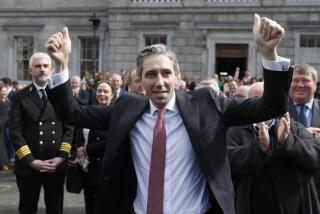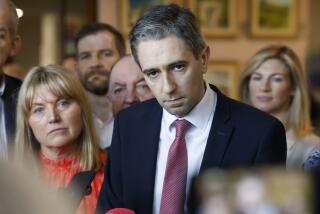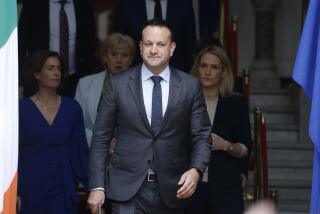Mavericks Make Impact in Irish Politics : New Party Brands Cherished National Traditions as ‘Nonsense’
DUBLIN — The lecture hall at University College was packed with students who listened raptly and applauded often as Mary Harney led Ireland’s sacred cows to the slaughter, one by one.
“A lot of nonsense,” was her description of such totems as unification with Northern Ireland; the official use of Gaelic, the Irish language; the privileged position of the Roman Catholic Church and old party loyalties forged in Ireland’s civil war more than 60 years ago.
Someone dropping in on the lecture by chance might have thought her a black humorist or campus activist.
Not so. Harney, 32, is a member of Parliament and co-founder of a two-month-old political party that has struck a deep chord of response with its promise to “break the mold of Irish politics.”
Ireland’s political Establishment has called the Progressive Democratic Party a flash in the pan, but Harney and co-founder Desmond O’Malley appear to be building a strong following.
Failed Promises
The party arose at a time of 17% unemployment, innumerable failed promises of economic recovery and widespread disenchantment with the two major parties. Its main appeal is to the young, who are rapidly becoming the largest voting bloc in this country of 3.5 million.
There is a palpable sense of change in the republic. It is emerging from the green Celtic mist in which it was swaddled by its founders and opening up to the outside world, moving from a rural society to industrialized urban life.
“We are the new Europeans,” says a poster at Dublin International Airport under a picture of smiling young Irish college graduates.
An opinion poll taken at the beginning of February indicated that 25% of Ireland’s voters would support the Progressive Democrats, two points ahead of Prime Minister Garret FitzGerald’s Fine Gael, which leads the government coalition.
If that carried through to a real vote, the Progressive Democrats would have a commanding role in any coalition.
A Product of Defectors
The opposition Fianna Fail remained at the top with 42% support, but the new party is a product of Fianna Fail defectors. The largest party’s leader, former Prime Minister Charles Haughey, no longer seems to be the unbeatable candidate in the 1987 election.
“The politician of the moment is Mr. O’Malley. The eyes of the electorate are on him,” the respected Irish Times, which commissioned the poll, said in an editorial. “The opportunity is all his.”
The impetus for the new party came in November when Haughey denounced the Anglo-Irish agreement that gives the republic a consultative role in the affairs of British-ruled Northern Ireland.
His reaction was unpopular, because there was a strong feeling among the Irish that the agreement could help bring peace to the troubled province.
Harney defied Haughey and voted for the accord Nov. 21. She was expelled from Fianna Fail for breaking discipline and founded the Progressive Democrats on Dec. 21 with O’Malley, a 47-year-old lawyer and fellow member of Parliament.
Expelled From Fianna Fail
O’Malley was expelled from Fianna Fail after a previous feud with Haughey.
Within days, two other Fianna Fail members in the 166-seat lower house joined the Progos, as the party has been nicknamed, along with a senator from the Labor Party, junior partner in the governing coalition.
The Progos speak to capacity crowds, and hundreds of people line up afterward to join.
More to Read
Sign up for Essential California
The most important California stories and recommendations in your inbox every morning.
You may occasionally receive promotional content from the Los Angeles Times.










